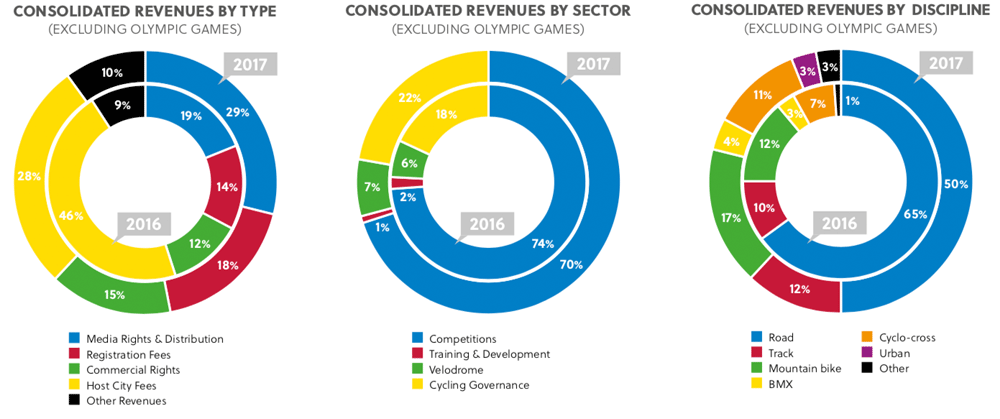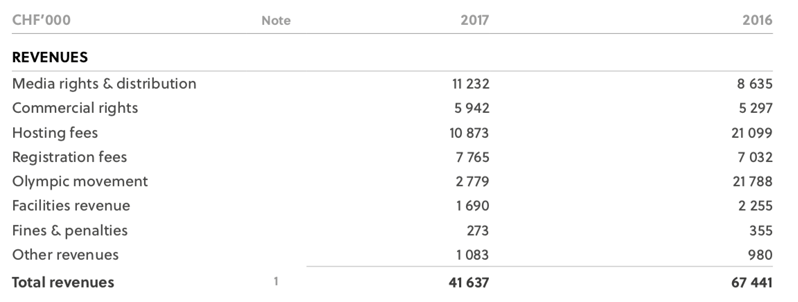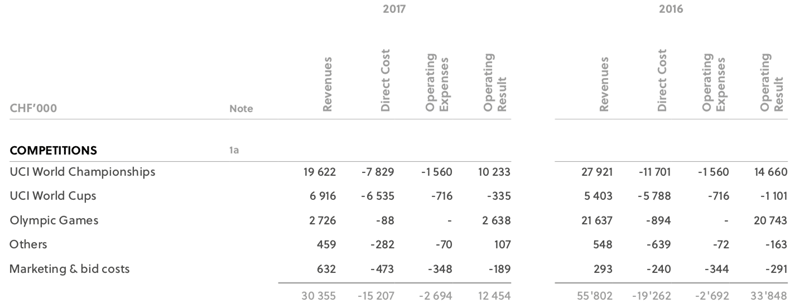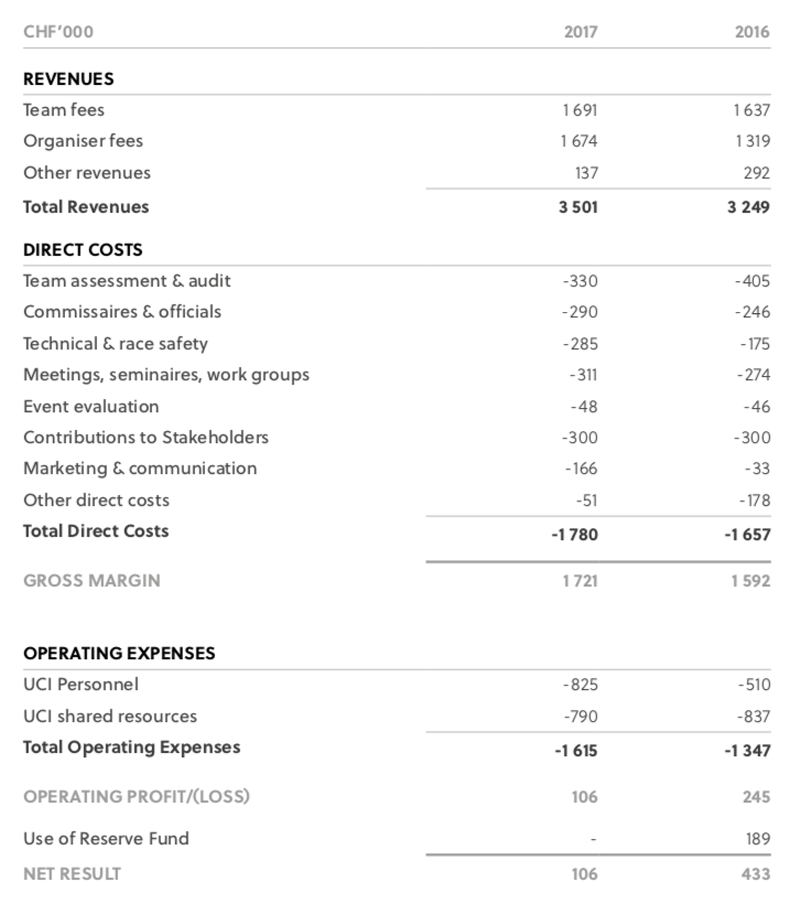The annual look at the UCI’s finances, a chance to follow the money behind the governing body. You can download the full report from the UCI website or scan the summary below.
As a reminder the UCI is cycling’s governing body and it has eight primary activities: road, track, mountain, BMX, para-cycling, cyclo-cross, indoor and trials… the last one being the test of balance rather than the past proclivity to issue law suits. The UCI sets the rules for the sport but “governing body” implies a degree of authority it doesn’t always possess, especially in men’s road cycling where it has to juggle competing interests. All the numbers here are in Swiss Francs (CHF) because the governing body is based in Aigle, Switzerland – inside a small building tucked behind a retail park – and the exchange rate is mentioned below but for shorthand you can equate one Franc to one Euro or Dollar.

The three charts show once again the UCI is reliant on road cycling and more specifically its World Championships. The first shows how the host city fees, essentially from the Doha road world championships, made up almost half of the UCI’s income in 2016 and in 2017 the Bergen world championships were less lucrative but still counted for plenty. Doha wasn’t memorable for sport but provided a CHF 22.3 million. But contrast the 2017 event in Bergen seemed jolly but ended with Bergen 2017 AS, the local organising entity, going bankrupt and leaving a debt to the UCI, it has booked a bad debt of CHF 1.14 million which means it’s still holding out for this sum but banking on it. The new “Urban World Championships” (mainly BMX and trials) were launched as part of the UCI’s deal with Wanda Sports and ran at a small loss.

2017 saw a big fall in revenue which looks bad but can be explained. First there’s the comparison between the bumper Worlds in Doha and the Bergen bankruptcy which accounts for about ten million Francs. Next comes the Olympic revenues and to explain the UCI is a member of the International Olympic Committee and gets allocated money from the Olympics and under new accounting rules it recognises all this money from 2016 to 2020 up front and so line of CHF 21.788 million for 2016 is something the UCI used to spread across the period of an Olympic cycle.

As if to ram home that Doha was lucrative and Bergen less so we see the Worlds in 2016 delivered an “operating result”, jargon for profit, of CHF 15 million. As bad as Bergen was it still helped to deliver CHF 10 million in profits for organising the Worlds. The road worlds remains the UCI’s single biggest source of income: the road worlds bring in more than the BMX, cyclo-cross, track and MTB worlds and World Cups combined.
More notes
- The UCI collected CHF 1.285 million compared to CHF 1.237 million the previous year for anti-doping, largely levies on races, teams and riders from prize money and fees and some of this funds the UCI’s anti-doping activities such as its Legal Anti-Doping Service while the quasi-independent Cycling Anti-Doping Foundation has a total budget of about CHF 7 million
- The UCI has a velodrome at its HQ and repairs to the roof resulted in accidental damage closing the track for some time meaning no income, it has made an insurance claim for CHF 598,000
- The UCI’s restaurant and canteen turns over a million francs a year and operates at a small loss, if you’re passing you’re welcome to drop in as its open to all
- Presidential salary spend fell from CHF 312,000 to CHF 308,000 but spending on pension and social charges went up from CHF 75,000 to 86,000. There’s no explanation of the split between the outgoing President Brian Cookson and his replacement David Lappartient but a separate note says Cookson was resident in Switzerland during his time at the UCI, David Lappartient isn’t and his pay packet is subject to French social security law which means it could be higher
- The UCI’s finance director is Jeremy Conrad-Pickles, a Briton who remains despite the exodus of Brits when Brian Cookson was ejected last year
- Staff headcount at the UCI rose by one to 115 in 2017
- The UCI lost half a million francs dabbling in the foreign exchange markets, it is exposed to currency risk as it has income and expenditure in both Euros and Swiss francs and tries to hedge against this
- The value of bank guarantees lodged with the UCI by World Tour and Pro Conti jumped from CHF 95.5 million to CHF 111.3 million a pro rata increase in the total salary count for these two tiers, presumably reflecting both a rise in the average pro salary but also the expansion of the Pro Conti ranks from 22 to 27 teams

UCI World Tour: The UCI gives accounts for it but the funding is controlled by a committee called the Professional Cycling Council which includes the UCI but also the teams, riders associations, race organisers and others. Here is the income statement for 2017:

Note the total revenues of CHF 3.5 million for the World Tour. As much as the World Tour is the big shop window for the sport, the UCI isn’t collecting a fortune from it and the income here is held in an account effectively under joint control of the UCI, the pro teams and the big race organisers. The teams are keen to have more control of this, to take over promotion and admin from the UCI, a story to watch in the coming months and years perhaps.
Note there’s no separate account of the UCI Womens World Tour, it’s a label rather than an actual concept with its structures and regulations. The Women’s World Tour remains a copy-paste of the UCI’s Continental rulebook, the men’s third tier that is pro-am and there’s specific mention of women’s cycling in the accounts behind a line of “other governance” which includes equipment testing and motor detection. Talking of which we’re likely to see an increase in expenses for the next set of accounts with the new X-ray testing regime and also the UCI’s video commissaire, both of which require more staff to operate but also a technology and vehicles to transport them in.
Conclusion
A big fall in revenue for 2017 but that’s largely because 2016 saw a big increase thanks to the Doha Worlds and the accounting policy change that saw the UCI declare several years’ income from the Olympics in one lump sum. Otherwise there’s not too much change, 2017 was still Brian Cookson’s final year and so if there’s going to be a change in priorities and spending under David Lappartient the numbers won’t start to show until next year. What is worth remembering once again is that the UCI is a medium sized governing body with a small HQ tucked behind a retail park in rural Switzerland and its annual budget is less than that of Team Sky.
Exchange rate on 31 December 2017 CHF 100 = US$102 = €85 = £75.


“UCI is a medium sized governing body with a small HQ tucked behind a retail park in rural Switzerland and its annual budget is less than that of Team Sky.”
With apologies to pro cycling’s cheerleaders here who don’t want to read anything even remotely critical, I’m not sure if UCI’s budget is too low or SKY’s is too high.. but either way this is not good.
How big does the UCI and its budget need to be? The likes of ASO and RCS actually do most of the day to day running of the sport, at least on the road side of things
Most recent ‘skirmish’ involving budget is probably the Salbutamol case. Where Froome/Team Sky had resources to hire a small army of lawyers and the UCI + WADA avoided a potentially costly trial.
Meh, the governing body being smaller than the teams isn’t a big deal. 99% of top pro sports the richest teams are richer and larger than the governing bodies/league organization/etc.
Indeed, it’s just a means to point out that the UCI isn’t a big organisation in charge of the sport with lots of money to help get things done.
What’s your solution Larry? Don’t be shy. That’s not like you at all.
What’s that? Budget cap? Hobble Sky? Anyone but Sky?
Got it.
Doha every year, I say.
Here here!
Hear not here
Maybe they’re in Doha…?
The UCI are simply like many other Governing Sports Bodies. Much smaller than many of their constituent parts. They are essentially a management group charged with overseeing the running of the sport. They don’t manage their own constitution, rules and regulations to well as it is. What would more money bring to this important aspect of their role ?
It would be both wrong and unwise to blame the recent Salbutomol case simply on money. The case was evidence based – unless yoda knows something that most are not privy too.
I agree the Salbutamol case is complex and nuanced as this blog previously has discussed at length.
However the means of engaging lawyers is a resource battle which had at least changed the procedures applied in contrast to previously known cases. Whether (unleaked) cases were dealt with similarly is not public knowledge.
It’s also costly to retain experts. In a hypothetical situation if there is a debate over a topic that has only a few people able to speak with authority on the subject then if one side quickly signs up most of these people on a retainer to provide advice the money does help.
What is the point of you raising this “hypothetical situation”? You say often enough that you don’t want one of your posts to descend into a debate about Team Sky but here you are throwing petrol on to a burning fire with this “hypothetical situation” which simply feeds the flaming torches for the likes of Larry T to turn everything into the same boring, sterile rant about Team Sky.
+1 for not yoda. When a big-money team can out-lawyer the authorities charged with enforcing the rules, it’s not a good thing. We’ll likely never know how many other SKY-related dodgy test results have (or will) come back while the UCI blinks first because they know the likely outcome of taking on Brailsford and Co. after the Froome affair.
Unless you know different Larry the answer is zero. Arguments from silence are terrible arguments. Plus Sky are no doubt being hacked or subject to unethical leaks weekly so if there was anything to find we’d know. But its nice folks like you even want to blame Sky for the UCI’s finances. No agenda there at all. You’re actually much like so-called Sky fan boys in that everything always comes back to Sky for you. Its an obsession.
+1 Ronde
+1. The only disappointing thing about the Sky situation is that the UCI didn’t make any money out of it. If it were US Postal then Armstrong would be calling for more testing and would have donated money for a testing machine.
JK. The most disappointing thing about Sky is that they don’t have a women’s team.
The Salbutamol case provides an interesting example of the potential power of money. Despite INRNGs point about SKY being able to ‘buy’ up all the experts, this doesn’t answer the obvious question as to what happened to all those experts with an opposing scientific view. I don’t think scientific ethics would allow all of them all to be bought.
Unless more information is forthcoming I think we all should accept that the WADA/UCI decision was science based – and probably cost a lot of money.
SKY is a wealthy team, no question. The UCI by comparison are small financial fry and are likely to remain so for the foreseeable future based on their potential revenue streams.
Scientific ethics. Like sports ethics or political ethics, right? Because all these jobs are known to be so ethical and independent from money, right?
You seem to imply that for all scientists there simply is no other choice than to honor scientific ethics as if that would come with being a scientist. A look around the world would show you that those with the money to do it buy scientists in the ten thousands every year for their propaganda and their „thinktanks“. tobacco firms, oil companies, governments and others all buy science to counter science they don’t like. Indeed, unethical scientists have damaged the world beyond belief selling their services to people, who harm the planet and human beings just to make a profit.
There surely are many ethical scientists, but to say: Scientists are ethical per se, therefore it must be accepted, that sky must be right is a bit..well.
What is true is this: When for a subject for example only 5 experts exist, because they are the only ones having studied, published and worked on that subject and you buy the expertise of all these 5 experts, because you have the money to do so, there is not much anybody else can do. You don‘t even have to use their expertise. The moment you pay them, you own them and they can‘t be used by others. This surely is much cheaper than many other ways to get the outcome you like to get.
And this has what to do with the finances of the UCI? FIFA are massively wealthy yet does anyone think football is clean? The IOC similarly have their noses in the corporate trough. Do you trust all Olympic sports?
What has this to do with the uci finances you ask. Very simple. If the governing body, which is tasked with upholding the rules and upholding them to everybody the same, has less resources than 1 single team (and that team has massively more resources than all other teams), then there simply is no way how the governing body can uphold the rules to that team. It can only do so, if that rich team choses to comply (because in some cases the team will rather take the fine than to have bad publicity). The moment that team choses to not comply, they have the resources to do just that. And exactly that just happened with the froome case as can be read in the reasoned decision. As we live in a world where money buys you everything , the rich team will always have more possibilities not only than other teams, but even more than the governing body which theoretically should govern that team. But to govern you need the resources to govern.
If that doesn‘t worry people, it is worrying. There is no fair sport, no fair competition, if one team has the monthly budget, that others have for a whole year. And it gets even more ridiculous, when that team has as the sole team more budget than the governing body AND a „sponsor“ behind them, which would go all the way to get their way (how many other sponsors than a murdoch would do that?). And that is where the finances of the uci come into play in this situation.
That other sports are not clean although their governing body is rich is not really an argument, is it? They have at least the chance to govern their sport, even if they chose not to. The uci doesn‘t have this chance. In truth it can only go after those cases, which they can win easily. The moment a team challenges them and has the resources to do it, their bluff is up.
Most sports I can think of have hugely rich players or teams and most governing bodies are relatively poor by comparison. Cycling is no different in this respect. Unless you can tell me why cycling is different to tennis, football, athletics, baseball, NFL, F1, etc, then I’m not really sure what your argument is outside of you have a distaste for Team Sky. In fact, the consequence of your rhetoric seems to be that teams and sportspeople should be kept poor so they don’t make a mockery of the governing body and its rules. Which is absurd.
As an example. Man UTD spends nearly 4 times the expenditure of the FA.
The International Olympic Committee is probably the world’s largest private company.
The Royal and Ancient rules over golf.
The Jockey Club owns horseracing in the UK and until very recently was the governing body too.
These are sports bodies with real power because they also own the assets.
One thing the UCI does own is frame stickers for its own type approval.
– Is this not shown as a revenue stream anywhere?
The frame stickers are just a PDF emailed out to the manufacturers, but I would assume they get some income from the fees linked to the certification process.
On the subject of the UCI certification the accounts show there’s income of CHF 447,000 for the year. The UCI is moving away from its own standards towards the ISO ones.
The frame stickers are just a PDF emailed out to the manufacturers, but I would assume they get some income from the fees linked to the certification process.
It’s probably part of the ‘other cycling governance’ category.
“The International Olympic Committee is probably the world’s largest private company.”
Apparently Google is not YOUR friend…
If it isn’t private please can you tell me who owns it as beneficiary? It awarded marketing and media contracts but quickly brought those back in-house. There are trickle down benefits to country-based committees and sport-based associations ( inc UCI ) but this is done to protect its assets just as much as to keep the athlete conveyor rolling towards each games. It has its own international laws and taxation regime. Accounts show lots of assets and revenues, there’s a pension liability and allowances for directors, $14.4m to WADA and so on, but who owns it? (To be fair this is an old topic of debate and wonderment)
Plurien – non-profits aren’t owned by anyone as a beneficiary. The assets, liabilities and revenue and expenses in theory net to zero. Any surpluses or deficiencies are not passed up or covered by a parent company, but remain on the books year-over-year.
Plurien – I highly doubt the IOC is the world’s largest private company. I also don’t think it’s operated as a private company, it is likely structured as a non-profit (legally structured as non-profit, regardless of cash surpluses and for profit activities/assets).
Lastly, I think your conclusion that sports bodies with real power have power because they own assets is incomplete. This is too complicated an issue to sum up in one sentence. Quickly, IOC owns very little of the assets that run each Olympic event, likely they own zero of the assets for each 2-week sports tournament, yet they exert significant control over the execution of the events.
I don’t want to nit pick, but the Jockey Club does not ‘ own racing’ in the UK. It owns a large number of racecourses, though by no means all the more famous ones ( it does not own or have any influence over Ascot, Goodwood or Newbury). It also operates a number of communal gallops for training . It is also a private club,with members who are invited to join. These are usually but by no means always, owners and or stewards .
The governing body is the BHA. Administration of the the rules of racing, agreement on race fixtures, handicapping, levies and subsidies are centralised at the BHA. The BHA is responsible for all disciplinary matters, including doping , betting irregularities, animal welfare and jockey conduct. Race meetings are supervised by unpaid ‘stewards’ , assisted by one or two stipendaries’, who can disqualify a horse, reverse placing and issue riding bans at the meeting. They can also delay or cancel a race or meeting, or alter the conditions if the weather or other external factors require it. All stewards are trained and licensed by the BHA. No meeting under rules can operate without the correct number of stewards.
WADA were involved too. Sky’s budget for absolutely everything for the whole year is the same as Man Utd spend in 5 weeks on just players salaries. You don’t need millions to hire some good lawyers and get some expert advice. You don’t even need hundreds of thousands. There seems to be a disconnect between reality and beliefs because Sky is the rich team. They may well be but they’re in a puddle, let alone a pond, in comparison to major sports around the globe.
The argument seems to be here (from some at least) that the UCI is a financially insignificant body that doesn’t even have the funds to defend its own rules. Well why would it be anything else? Its not FIFA. Its not the Olympics. It runs a sport anyone can watch for free just by standing next to the appropriate road. Its runs a sport which, for most of the time its events are running, is just a load of people rolling along on bikes. Even the most hardened fan would admit this is boring a lot of the time. Our host here has even included comments about watching the last 10 minutes of sprint stages in his race previews many times so he knows too.
So why exactly should we expect the UCI to be having gold dubloons leak out of every orifice? Its a relatively small body of a sport that will hardly ever be TV friendly. That’s where the money is. And that’s why it is never likely to have much of it.
According to the website, the UCI restaurant is great for weddings with views of the velodrome and the Rhone.
The restaurant is very good.
Anyone in the area should pop in around lunchtime for a look around and a bite to eat. The views are amazing (over the mountains, not the retail park!)
The effectiveness of a governing body is not decided by its income/resources, but whether it is listened to by those in its sport. Money can help, but in the end if a governing body is not respected, it is not a governing body, it is a campaigning body trying to get others to implement its agenda.
I think what we’re talking about is the alleged possibility that a team or rider sues anti-doping enforcers and is awarded a compensation too substantial for the body to afford. This is totally unacceptable by any imaginable standard. Ordinary courts should, as in the famous Decker-Slaney case, declare themselves not competent. Besides, governments should shoulder, financially and through legislation, anti-doping bodies. Finally, riders should explicitly give up any possibility of taking UCI or WADA to court, as it’s a possibility that only benefits the very wealthiest of them, and seriously undermines the credibility of the sport and of anti-doping.
I think everybody who visits this site knows what Sky’s is budget is by now, was it really necessary to mention them in the article?
You’d be surprised, there are still wild estimates for Sky’s budget in the media despite the team publishing accounts. It’s a short hand comparison, not too useful but helps situate how the UCI’s a relatively small budget operation.
It’s unbelievable the cycling coverage and insight the @inrng manages on their tiny budget.
The above info is all income/expenditure related – no balance sheet?
It’s published of course but there didn’t seem to be much of interest worth sharing. The UCI does receive cash from the Olympics and then goes and invests this.
I never realized the World’s host fees were that high. That certainly makes it a challenging proposition for any host organization to try make money on hosting World’s. That’s also not the kind of money most local governments would be willing to spend for that kind of thing (or even have in the first place). I suppose an extra bravo to hosts like Richmond and Geelong (and even Bergen) where bike racing isn’t a part of the “culture” like in Belgium, Netherlands, etc.
I also got a kick out of the 273k in fines and penalties, but I wonder what accounted for the drop from 355k in 2016.
There’s all the fines for sticky bidons and so on but this is much more dependent on big items like anti-doping cases.
The Bergen Worlds was an excellent spectacle of the sport, the organisers should announce that the payment in kind to the UCI was over and above the deficit and declare that the matter is closed.
Hopefully they paid all the suppliers and contractors first.
Switzerland is hardly the cheapest place to run the sport from. Are there any estimates of how much money would be saved if the UCI HQ moved away anywhere else in Europe or the world.
Surely there advantageous tax laws that are more beneficial than superficially increased costs around salary and expenses?
Surely any country can (and would) grant full tax immunity and any other privilege Switzerland may offer, to any supranational body it is intending to host.
Other countries are trying, like Dubai but Switzerland just has so many sports bodies and the IOC that there’s a strong network effect of people wanting to work close to each other.
Sports bodies based in Switzerland enjoy association status, and so are not obliged to register with the state or publish their accounts. They also benefit from tax breaks and very flexible legal terms, which mean they can govern their own affairs and are mostly exempt from Swiss anti-corruption laws.
Out of all of these points, I think I can guess which is the most attractive for the vast majority of sporting bodies….
Thanks for sharing the UCI report. I note therein that “in 2017, 20 TUEs were granted (compared to 15 in 2016; 13 in 2015; 25 in 2014 and 31 in 2013). Not exactly the best trend hte last 2 years.
Be careful Bundle, the “sons of Hein Verbruggen” here don’t take kindly to negative posts about the sport. But at least you didn’t mention the Team That Can’t Be Criticized, so perhaps nobody noticed?
How many of them were issued to that team Larry?
Larry misses critical thinking skills sometimes so hope he doesn’t mind if I step in. 🙂
Some of these numbers don’t include all the TUEs handed out by National Federati or Anti Doping authorities so it’s hard to ascertain a trend. The rules were changed however so they should be only through the UCI for ‘international riders’ and not through the Federation anymore. It still probably doesn’t account for all TUEs though as I believe the anti doping authorities can still give them out. The hope and understandable expectation is that the TUEC and anti doping authorities are far stricter and competent than a rider national federation might have been.
Right with my first sentence, wrong with the second. No surprise I guess.
You seem to have abandoned all your previous pious little homilies about keeping the debate on here civilised and respectful. All you do now is carp and whine about other posters. Please go somewhere else with your petty, childish sniping.
Black and white world to you Larry. Not for all of us though. Subtleties not a strong point either then.
If it doesn’t say how many applications were made, or how many TUEs granted (and applied for) through national governing bodies, I don’t see how you can draw any meaningful conclusions.
2 data points do not a trend make. Besides, when dealing with numbers this small, random variability has a disproportionate effect.
“There’s no explanation of the split between the outgoing President Brian Cookson and his replacement David Lappartient but a separate note says Cookson was esident in Switzerland during his time at the UCI, David Lappartient isn’t and his pay packet is subject to French social security law which means it could be higher”
Wouldn’t it be lower considering cost of living in Switzerland?
It’s not the supermarket shop or buying a house, it’s the tax rate. French social security contributions are probably higher, the payroll taxes usually rank among the highest in the world. The point here isn’t so much tax, more that Lappartient visits rather than resides at the UCI.
Let’s not get fired up shall we? After all these lengthy wordings, are we likely to wrap up with no more than 50 words from the Report? Anyone doing so will be greatly appreciated, and if you can state your qualification e.g. CFA, CA, Lawyer with specialty in Taxation. LA is probably reading this, so speak up or forever … (just joking)
“As a reminder the UCI is cycling’s governing body and it has eight primary activities: road, track, mountain, BMX, para-cycling, cyclo-cross, indoor and trials”
Track AND Indoor? What’s the difference?
Cycle polo, gymnastics etc compared to the track which can be indoor and outdoor.
Indoor Cycling comprises both artistic cycling and cycle-ball. Cycle polo is a much more niche fun sport, which is not part of the UCI.
Also, btw. Cycle polo is played outdoor as well
While Bergen 2017 AS failed with large debts after the worlds in Bergen, the UCI should not have to worry much about getting paid. The event was contracted to Norways cycling federation, and they had to guarantee all fees to the UCI when handing the event over to Bergen 2017 AS. The UCI debts would go bad only if the federation went belly up. Thats not likely to happen.